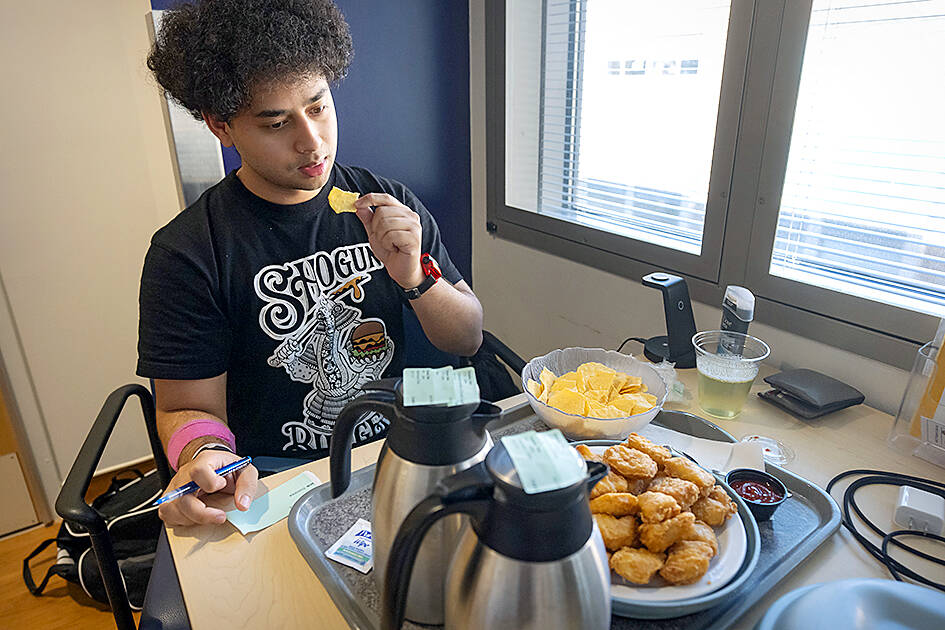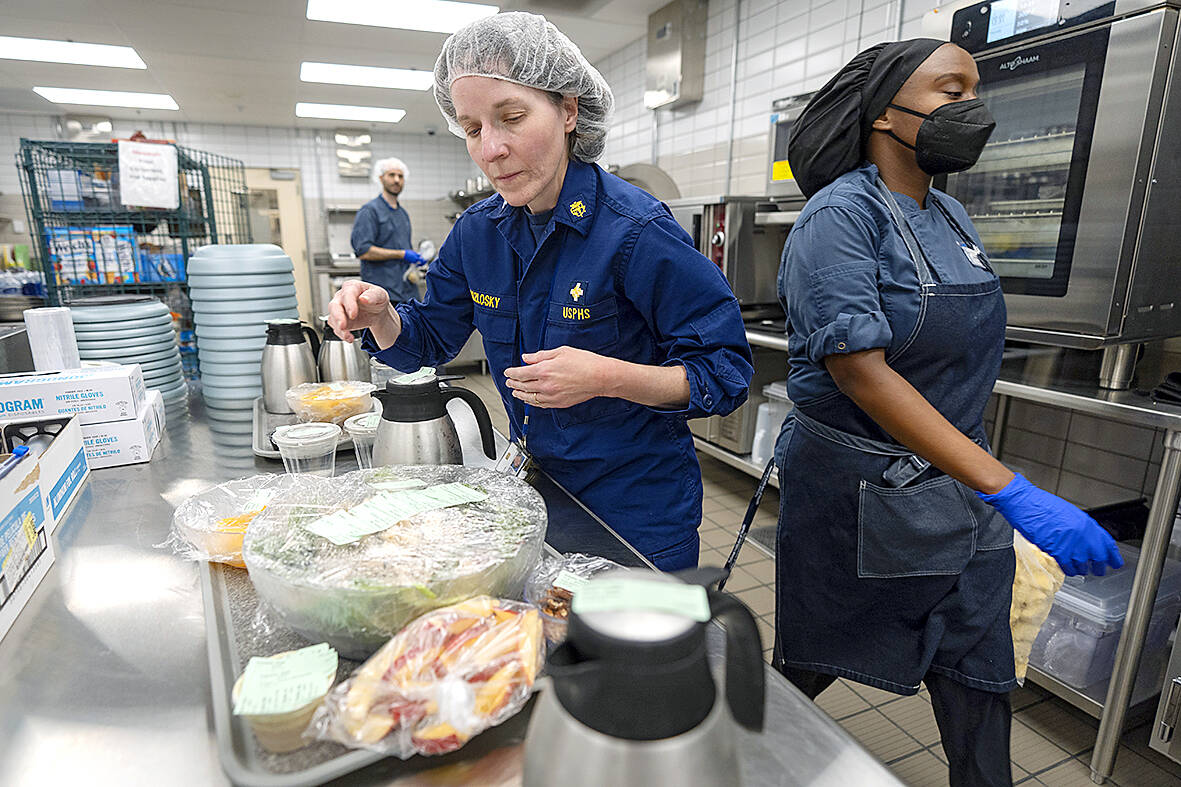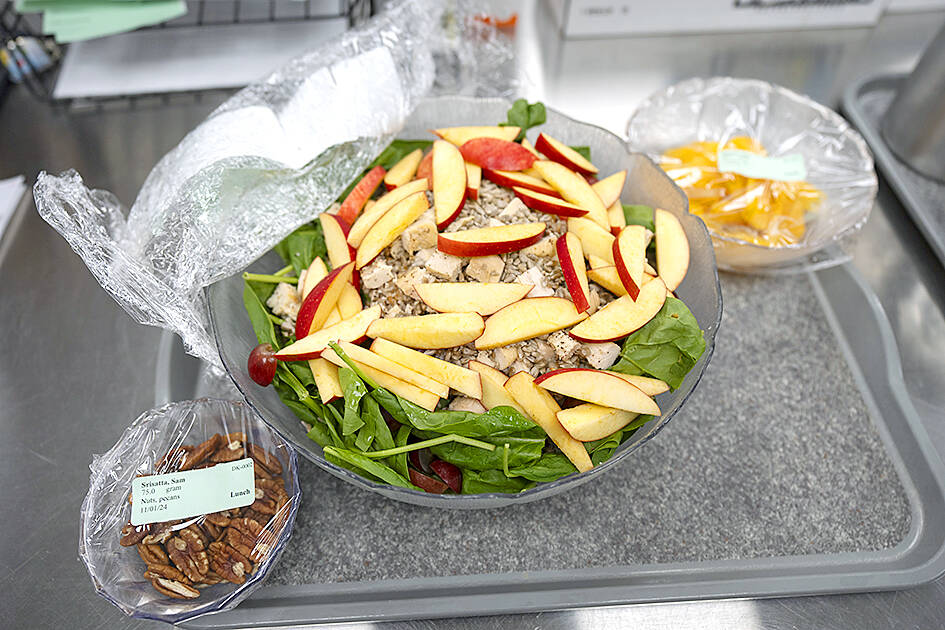Consuming large amounts of ultra-processed food (UPF) increases the risk of an early death, according to a international study that has reignited calls for a crackdown on UPF.
Each 10 percent extra intake of UPF, such as bread, cakes and ready meals, increases someone’s risk of dying before they reach 75 by 3 percent, according to research in countries including the US and England.
UPF is so damaging to health that it is implicated in as many as one in seven of all premature deaths that occur in some countries, according to a paper in the American Journal of Preventive Medicine.

Photo: AP
They are associated with 124,107 early deaths in the US a year and 17,781 deaths every year in England, the review of dietary and mortality data from eight countries found.
Eduardo Augusto Fernandes Nilson, the lead investigator of the study, from the Oswaldo Cruz Foundation in Brazil, said that additives such as sweeteners and flavorings harm health not just UPFs’ high levels of fat, salt and sugar.
The authors found “a linear dose-response association between the ultraprocessed food consumption and all-cause mortality” when they examined official surveys previously undertaken in the UK and US, as well as Australia, Brazil, Canada, Colombia, Chile and Mexico.

Photo: EPA-EFE
While 4 percent, 5 percent and 6 percent of premature deaths in Colombia, Brazil and Chile respectively are “attributable to UPF consumption,” the equivalent percentage is 10.9 percent in Canada, 13.7 percent in the US and 13.8 percent in England — the highest proportion among the eight countries.
“Premature deaths attributable to consumption of ultraprocessed foods increase significantly according to their share in individuals’ total energy intake. A high amount of UPF intake can significantly affect health,” the researchers concluded.
Death rates are highest in the countries where the population gets the largest amounts of total energy from eating UPF.

Photo: AP
In England that is 53.4 percent, according to the National Diet and Nutrition Survey undertaken in 2018-19. But it is even higher in the US — 54.5 percent.
“We first estimated a linear association between the dietary share of UPFs and all-cause mortality, so that each 10 percent increase in the participation of UPFs in the diet increases the risk of death from all causes by 3 percent,” Nilson said.
“UPFs affect health beyond the individual impact of high content of critical nutrients — sodium, trans fats and sugar — because of the changes in the foods during industrial processing and the use of artificial ingredients, including colorants, artificial flavors and sweeteners, emulsifiers and many other additives and processing aids, so assessing deaths from all causes associated with UPF consumption allows an overall estimate of the effect of industrial food processing on health.”

Photo: AP
While the burden of ill-health from UPF is highest in high-income countries, it is growing in low and middle-income nations, added Nilson.
The authors urged governments worldwide to introduce bold measures to tackle UPF, including tighter regulation of food marketing and the sale of food in schools and workplaces, and also taxes on UPF products to reduce sales.
The findings add to the growing body of evidence linking UPF to a higher risk of both specific illnesses, such as cancer and heart disease, and a increased risk overall of dying before 75. However, they found an association between UPF and early death, not that one definitely causes the other.
For example, US research published last year in the BMJ found that people who consume the most UPF have a 4 percent higher risk of death overall and a 9 percent greater risk of dying from something other than cancer or heart disease. It identified processed meat, sugar and ultra-processed breakfast foods, such as cereals, as the unhealthiest UPF products.

Google unveiled an artificial intelligence tool Wednesday that its scientists said would help unravel the mysteries of the human genome — and could one day lead to new treatments for diseases. The deep learning model AlphaGenome was hailed by outside researchers as a “breakthrough” that would let scientists study and even simulate the roots of difficult-to-treat genetic diseases. While the first complete map of the human genome in 2003 “gave us the book of life, reading it remained a challenge,” Pushmeet Kohli, vice president of research at Google DeepMind, told journalists. “We have the text,” he said, which is a sequence of

On a harsh winter afternoon last month, 2,000 protesters marched and chanted slogans such as “CCP out” and “Korea for Koreans” in Seoul’s popular Gangnam District. Participants — mostly students — wore caps printed with the Chinese characters for “exterminate communism” (滅共) and held banners reading “Heaven will destroy the Chinese Communist Party” (天滅中共). During the march, Park Jun-young, the leader of the protest organizer “Free University,” a conservative youth movement, who was on a hunger strike, collapsed after delivering a speech in sub-zero temperatures and was later hospitalized. Several protesters shaved their heads at the end of the demonstration. A

Every now and then, even hardcore hikers like to sleep in, leave the heavy gear at home and just enjoy a relaxed half-day stroll in the mountains: no cold, no steep uphills, no pressure to walk a certain distance in a day. In the winter, the mild climate and lower elevations of the forests in Taiwan’s far south offer a number of easy escapes like this. A prime example is the river above Mudan Reservoir (牡丹水庫): with shallow water, gentle current, abundant wildlife and a complete lack of tourists, this walk is accessible to nearly everyone but still feels quite remote.

In August of 1949 American journalist Darrell Berrigan toured occupied Formosa and on Aug. 13 published “Should We Grab Formosa?” in the Saturday Evening Post. Berrigan, cataloguing the numerous horrors of corruption and looting the occupying Republic of China (ROC) was inflicting on the locals, advocated outright annexation of Taiwan by the US. He contended the islanders would welcome that. Berrigan also observed that the islanders were planning another revolt, and wrote of their “island nationalism.” The US position on Taiwan was well known there, and islanders, he said, had told him of US official statements that Taiwan had not